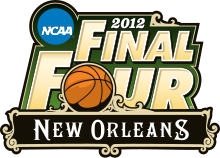 | |||||
| Teams | 68 | ||||
|---|---|---|---|---|---|
| Finals site | Mercedes-Benz Superdome New Orleans, Louisiana | ||||
| Champions | Kentucky Wildcats (8th title, 11th title game, 15th Final Four) | ||||
| Runner-up | Kansas Jayhawks (9th title game, 14th Final Four) | ||||
| Semifinalists |
| ||||
| Winning coach | John Calipari (1st title) | ||||
| MOP | Anthony Davis (Kentucky) | ||||
| |||||
The 2012 NCAA Division I men's basketball tournament involved 68 teams playing in a single-elimination tournament that determined the National Collegiate Athletic Association (NCAA) Division I men's basketball national champion for the 2011-12 season. The 74th edition of the tournament began on March 13, 2012, and concluded with the championship game on April 2, at the Mercedes-Benz Superdome in New Orleans.
The Final Four consisted of Kentucky, making their second appearance in the Final Four under John Calipari, Louisville, making their second appearance under Rick Pitino and first since 2005, Kansas, making their first appearance since winning the 2008 national championship under head coach Bill Self by defeating Calipari's Memphis team, and Ohio State, making their first appearance since their runner-up finish in 2007 and second under coach Thad Matta. This was the first (and only) tournament that both national semifinals and the national championship game were regular season rematches.[1] Kentucky defeated Kansas in the championship game 67–59 to win their first national championship since Tubby Smith led the team there in 1998. This was Calipari's first national championship in four trips to the Final Four, having previously gone there with Kentucky in 2011, Memphis in 2008 and Massachusetts in 1996.
Upsets were once again the story of the tournament in 2012, and for the first time ever two #15 seeds won in the same tournament. In the South Region, #15 Lehigh of the Patriot League defeated #2 Duke. In the West Region, #15 Norfolk State of the MEAC, making their first ever NCAA tournament appearance, defeated #2 Missouri as a 21.5 point underdog, the second biggest upset in terms of point spread in NCAA tournament history, behind Fairleigh Dickinson's defeat of Purdue in 2023, where Purdue was a 23.5 point favorite.
In addition to this, Ohio won a game as a double digit seed for the second time in four tournaments as the #13 seed Bobcats defeated #4 seed Michigan to advance to the third round of the Midwest Region. A team from the First Four games also won in the Round of 64 for the second consecutive year as South Florida defeated Midwest #5 seed Temple, setting up a #12 vs. #13 matchup that Ohio won.
Virginia Commonwealth, a Final Four team from 2011 as an #11 seed, made the 2012 tournament as a #12 seed and once again made the round of 32 by defeating South #5 seed Wichita State. The South Region saw four double digit seeds win in their opening games, as Colorado and Xavier joined VCU and Lehigh as victors. Xavier advanced to the Sweet Sixteen, where they were defeated by Baylor.
Despite the upsets, all four top seeds advanced to the Sweet Sixteen for the first time since 2009. Three made it to the Elite Eight, as only Michigan State of the West Region lost. Kentucky was the only one to advance to the Final Four as Syracuse and North Carolina lost in their regional finals. This would end up being the last Final Four until 2019 that did not include at least one team seeded #7 or higher, and still is the last Final Four to not include at least one team seeded #5 or higher as of the conclusion of the 2024 season.[2][3][4][5][6][7][8][9][10][11][12]
Two teams made their first NCAA tournament appearances in school history: MEAC champion Norfolk State and Summit League champion South Dakota State. Ivy League champion Harvard made its first appearance since 1946, ending the longest tournament drought in NCAA history.
All four teams from the state of Ohio (Cincinnati, Ohio, Ohio State, and Xavier) made it to the Sweet 16, marking the first time in tournament history any state has been represented by four teams in the round of 16.[13] This tournament was also the first tournament since 1985 to feature no teams in the Sweet 16 from the Mountain or Pacific Time Zones.
- ^ Davis, Withey will host block party in final ESPN.com, April 1, 2012
- ^ "2013 NCAA tournament: Bracket, scores, stats, records | NCAA.com". www.ncaa.com. Retrieved June 25, 2023.
- ^ "2014 NCAA tournament: Bracket, scores, stats, records | NCAA.com". www.ncaa.com. Retrieved June 25, 2023.
- ^ "2015 NCAA tournament: Bracket, scores, stats, records | NCAA.com". www.ncaa.com. Retrieved June 25, 2023.
- ^ "2016 NCAA tournament: Bracket, scores, stats, records | NCAA.com". www.ncaa.com. Retrieved June 25, 2023.
- ^ "2017 NCAA tournament: Bracket, scores, stats, records | NCAA.com". www.ncaa.com. Retrieved June 25, 2023.
- ^ "2018 NCAA tournament: Bracket, scores, stats, records | NCAA.com". www.ncaa.com. Retrieved June 25, 2023.
- ^ "2019 NCAA tournament: Bracket, scores, stats, records | NCAA.com". www.ncaa.com. Retrieved June 25, 2023.
- ^ "2021 Division I Men's Basketball Official Bracket | NCAA.com". www.ncaa.com. Retrieved June 25, 2023.
- ^ "2022 Division I Men's Basketball Official Bracket | NCAA.com". www.ncaa.com. Retrieved June 25, 2023.
- ^ "2023 Division I Men's Basketball Official Bracket | NCAA.com". www.ncaa.com. Retrieved June 25, 2023.
- ^ "2024 Division I Men's Basketball Official Bracket | NCAA.com". www.ncaa.com. Retrieved April 9, 2024.
- ^ Ohio is more than just Buckeye State ESPN.com, March 21, 2012